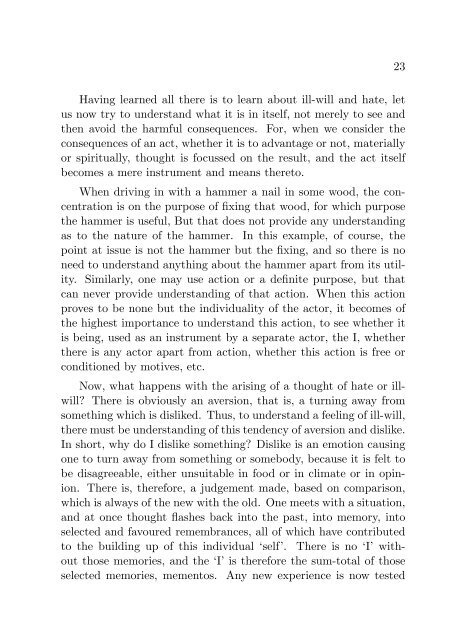Agony and Ecstasy
A comparative study of the five hindrances, together with the five states of concentration or mental absorption.
A comparative study of the five hindrances, together with the five states of concentration or mental absorption.
You also want an ePaper? Increase the reach of your titles
YUMPU automatically turns print PDFs into web optimized ePapers that Google loves.
23<br />
Having learned all there is to learn about ill-will <strong>and</strong> hate, let<br />
us now try to underst<strong>and</strong> what it is in itself, not merely to see <strong>and</strong><br />
then avoid the harmful consequences. For, when we consider the<br />
consequences of an act, whether it is to advantage or not, materially<br />
or spiritually, thought is focussed on the result, <strong>and</strong> the act itself<br />
becomes a mere instrument <strong>and</strong> means thereto.<br />
When driving in with a hammer a nail in some wood, the concentration<br />
is on the purpose of fixing that wood, for which purpose<br />
the hammer is useful, But that does not provide any underst<strong>and</strong>ing<br />
as to the nature of the hammer. In this example, of course, the<br />
point at issue is not the hammer but the fixing, <strong>and</strong> so there is no<br />
need to underst<strong>and</strong> anything about the hammer apart from its utility.<br />
Similarly, one may use action or a definite purpose, but that<br />
can never provide underst<strong>and</strong>ing of that action. When this action<br />
proves to be none but the individuality of the actor, it becomes of<br />
the highest importance to underst<strong>and</strong> this action, to see whether it<br />
is being, used as an instrument by a separate actor, the I, whether<br />
there is any actor apart from action, whether this action is free or<br />
conditioned by motives, etc.<br />
Now, what happens with the arising of a thought of hate or illwill?<br />
There is obviously an aversion, that is, a turning away from<br />
something which is disliked. Thus, to underst<strong>and</strong> a feeling of ill-will,<br />
there must be underst<strong>and</strong>ing of this tendency of aversion <strong>and</strong> dislike.<br />
In short, why do I dislike something? Dislike is an emotion causing<br />
one to turn away from something or somebody, because it is felt to<br />
be disagreeable, either unsuitable in food or in climate or in opinion.<br />
There is, therefore, a judgement made, based on comparison,<br />
which is always of the new with the old. One meets with a situation,<br />
<strong>and</strong> at once thought flashes back into the past, into memory, into<br />
selected <strong>and</strong> favoured remembrances, all of which have contributed<br />
to the building up of this individual ‘self’. There is no ‘I’ without<br />
those memories, <strong>and</strong> the ‘I’ is therefore the sum-total of those<br />
selected memories, mementos. Any new experience is now tested

















